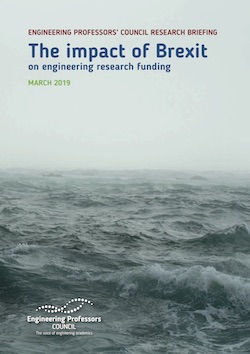 Updated 28/03/19
Updated 28/03/19
As the political crisis over Brexit continues in Parliament, an exclusive analysis by the Engineering Professors’ Council reveals that a cascade of effects – resulting simply from Brexit’s impact on engineering research – will deal a blow to the economy nationally and will hit certain regions even harder.
The analysis shows the critical role EU funding has in fuelling innovation through engineering research, which boosts industry at a regional level, which in turn drives the national economy.
Engineering research in UK universities receives £877 million in EU-based grants and contracts and is the largest national recipient of such funding. Under current Brexit plans, the UK would no longer be eligible for these funds and even if they were directly replaced by funding from UK taxpayers, that would still not compensate for the loss of a ‘multiplier effect’, which, the EPC calculates, increases the value of international research revenue by a factor of 3.35 as well as providing soft benefits.
The EPC research briefing, deeper analysis and downloadable data exclusively for members is available here.
Updated 30/1/17
 Assuming Theresa May is able to stick to her intended timetable (the first hurdle of which is to trigger Article 50 of the Lisbon Treaty by the end of March 2017), the UK will cease to be a member of the EU in 2019.
Assuming Theresa May is able to stick to her intended timetable (the first hurdle of which is to trigger Article 50 of the Lisbon Treaty by the end of March 2017), the UK will cease to be a member of the EU in 2019.
The picture is getting clearer about what this may mean. In the meantime, there are far more questions than answers. So, to support its members, the EPC has tried to ask the questions that engineering in HE needs answered most urgently and to summarise what we know so far (if anything). Rather than repeat what you will no doubt have seen elsewhere, we have tried to focus specifically on concerns and opportunities for engineering in HE.
These questions are complex. Our answers have tried to be simple, but they may be simplistic. There may well be other questions that need asking and our answers will undoubtedly benefit from further comment.
We would be grateful if you would use the comments facility to pose further questions and share your own reflections, expertise and, in particular, real life experiences in relation to the issues raised.
How Brexit might affect UK students?
Will engineering students’ mobility be affected? For instance, will they still be able to participate in the Erasmus programme?
There is no immediate change to the UK’s participation in the Erasmus+ scheme, with guaranteed funds for applications in 2016 and 2017[i]. After that, however, a British exclusion from the scheme is, for the moment, highly likely[ii]. Other non-EU members – Norway and Switzerland – do have agreements to participate and the UK might broker a similar arrangement. However, there are costs to participating in the single market and both Norway and Switzerland pay a contribution to EU programmes on research and education. The Government has so far provided no indication that it would do the same.
Update 5/10/2016: A petition has been started to urge the Government to continue to participate in the Erasmus scheme after Brexit.
Update: 30/1/2017: In her speech Brexit on 17th January, Theresa May made it clear that she has no intention of ‘buying back’ into elements of EU membership. However, in the Q&A session in the Commons later the same day, she hinted that the UK might “pay into specific programmes” after all. On balance, it looks like she regards continued membership of the ERASMUS+ programme as something for the negotiating table and not one over which she will lose any sleep.
Will UK students be more inclined to study engineering abroad given the increasing costs of studying in the UK and potential damage to their international work prospects?
The increase in costs was a reality before Brexit with the rises in tuition fees in recent years. In other European countries (such as Germany, the Netherlands and Denmark), the tuition fees are, relatively speaking, extremely low compared to UK universities – sometimes they are even free – and many such courses are taught in English[iii]. Some data suggest there has been a rise in recent years in the number of UK students taking up these opportunities to study abroad, however the evidence is not conclusive.
Many international engineering companies, such as Rolls Royce, which have strong links with UK HE engineering departments and support high quality students’ placements, might consider developing their core business outside the UK. This could limit the number and quality of placements available in the future, and students might consider taking studies abroad in universities with stronger links with international companies.
However, if Brexit means UK students face higher fees to study abroad, they may be put off. They may choose to opt for UK courses even though the quality and range of placements may have been compromised.
Will international partnerships be affected? For example, will students be as able to do placements in international companies during their studies?
See above.
Will the employment prospects of UK engineering students be affected?
This will depend on the impact of Brexit on the wider economy and the engineering sector in particular. See below. (It also depends on the impact on the financial sector, which recruits a significant proportion of engineering graduates.)
Economic pressure hits the recruitment of entry-level staff first and hardest. Engineering firms may scale down recruitment or, in the case of larger businesses, they may move it to other European countries.
However, the skills shortages in engineering are such that engineering graduates may find their skills are still in sufficiently high demand to be largely unaffected by economic tides.
Since employment rates are to be used as a key metric for TEF, any impact on graduates may have significant repercussions for universities and academic departments too.
How Brexit might affect international students?
Will UK universities still be an attractive place to study engineering for international students?
Update 26/01/2017: in the light of May’s ‘Global Britain’ speech, delivered on the 17th January, there is a willingness to keep the UK as a “magnet for international talent”, and high-skilled immigration, whether to work or study, but with a strict control of the number of people coming to Britain from the EU. Free movement to Britain from Europe will not be guaranteed.
Beyond Erasmus (see above), there are no immediate changes planned to the funding of EU students studying in the UK. For now, the Government is saying that students who have started a course before August 2016 will have the eligibility for the duration of that course. There’s no word yet on what will happen in future[iv]. However, if EU nationals are in future treated on a par with other international students when it comes to fees, it would leave them facing far higher costs to study in the UK and they are unlikely to be entitled to student loans. It is hard to imagine how this could not act as a powerful disincentive.
Having said that, Brexit may offer new opportunities for non-EU students to study in the UK thanks to lower competition from their EU counterparts. The same may happen with non-EU staff[v], although some reports suggest that Brexit may mean that the UK is regarded in future by people from outside the UK – both EU and non-EU – as less tolerant and welcoming.
The current low value of the pound will make international fee levels relatively more affordable[vi], but conversely, it will also make salaries paid in sterling less attractive.
Update 5/10/2016: In her speech to the Conservative Party Conference yesterday, Home Secretary Amber Rudd announced major new restrictions on international students coming to the UK to study. She is not waiting for Brexit before imposing these new rules.
The proposal includes limiting the availability of student visas to those accepted on to “high-quality” courses, but it is not clear how that would be determined. One suggestion is that high performance in the TEF may be used, but, since the discipline-level TEF is unlikely before 2019, that would mean that for the next few years all disciplines across an institution would have to be treated as equal for the purposes of student visas – which might be very bad news for engineering departments.
Another suggestion is that the Government would simply apply a prejudicial judgement of quality based on, for example, membership of the Russell Group. The Government’s argument is that these measures will preserve the quality of the education that the UK ‘exports’ by only allowing the best institutions to do so. However, given that the stated intention is to reduce absolute student immigration, the logic is flawed and the effect will be to drive down numbers not drive up standards.
Whatever the arguments, restrictions on international student numbers may be very damaging to UK engineering departments because of the loss of high-quality applicants, funding and international relationships. It will also impact on the UK skills shortage which will be exacerbated if the UK has to rely on a home-grown supply of engineering graduates.
Ms Rudd has said that there will be a consolation on the proposals. The EPC will examine them in detail and respond forcefully on behalf of UK engineering departments which attract far more international students than most UK HE courses.
Update 11/10/2016: The Department for Education has now confirmed that EU students applying for university places in England in 2017/18 will continue to be eligible for student loans and grants, and entitled to home fee status for the duration of their course, even past the point that the UK leaves the EU.
Welsh Education Secretary Kirsty Williams has also confirmed that EU students applying for a place at a Welsh university for 2017/18 will continue to receive financial support.
Update 14/10/2016: The Scottish Government have also announced that EU students commencing their studies in 2017 will be entitled to complete their studies post-Brexit without a change in fees status.
Will students still be able to do placements in the UK as part of their studies?
The assumption has to be that, post-Brexit, European students would have to apply for a student visa like other foreign nationals, adding to the complexity and obstacles of studying in the UK and doing placements.
Theresa May’s track record on student visas when she was Home Secretary was that she regarded them as too easy a target for exploitation by illegal immigrants. There have been no announcements to suggest that she will be more sympathetic as PM.
How Brexit might affect courses in engineering disciplines?
Will UK engineering accreditation still have the same international recognition?
Currently, European recognition is possible across the European Union and the EEA (the European Economic area – the countries covered by agreements on free movement of people and trade)[vii] and international recognition outside Europe is guaranteed through the Engineering Council’s membership of the International Engineering Alliance[viii]. However, recognition of Professional Titles, and the right to work in the EU, can be denied if UK leaves EEA [ix].
In other words Brexit is unlikely to have any significant impact on the recognition of accreditation, but it will be worth keep a close watch.
How Brexit might affect academic staff in engineering (lecturers, researchers, other staff)?
How safe are the jobs of European staff at UK universities?
Update 26/01/2017: in the light of May’s ‘Global Britain’ speech, delivered on the 17th January, it is still unclear what the status of the EU staff already working in the UK will be, as stated in point 6 (Rights for EU nationals in Britain, and British nationals in the EU). However, free movement to Britain from Europe will not be guaranteed, in order to control immigration.
For now, there’s been no change to the rights and status of EU citizens working in the UK. Nationals from the European Economic Area (EEA) can get a permanent residence card if they have lived in the UK for a continuous period of 5 years[x].
For EU nationals who have been in the UK for less time than that, there are no guarantees, however key Brexit campaigners argued after before and after the Referendum that anyone legally resident in the UK before the Referendum should be given a right to remain. The Government has refused to commit to this, linking the issue to the right of British citizens currently in European countries to remain there.
Given skills shortages in the UK, even if there is no blanket agreement on EU nationals, it has to be supposed that academics in engineering would be well placed to be allowed to stay in the UK along with their families (if already resident here). Unmarried partners, however, may face a more awkward position.
How safe are the jobs of UK staff at European universities?
See above.
How will the recruitment and retention of staff from the European Union be affected?
On this question, there are no answers – only more questions. How will Brexit affect staff who have been living in the UK for less than 5 years (not eligible for a permanent resident card)? How will this affect new staff who come to the UK after the Referendum?
In the long term, the recruitment of EU staff will depend on the negotiations between UK and the European Union. At the heart of those negotiations will be whether the free movement of people can be uncoupled from access to trade freely with the EEA. If it cannot and the UK Government decides that access to the free market is a price worth paying for immigration control, then recruitment is likely to be restricted.[xi]
Academics and researchers in engineering will be regarded as more desirable immigrants than most, but even to have to talk in such terms illustrates the change that might take place.
Will British academics be as able to move to positions in European institutions?
That will depend on the outcome of Brexit negotiations, but unless an arrangement is made for the free movement of people, the process is likely to become more bureaucratic at the very least.
How Brexit might affect engineering research and innovation?
Will it be possible to secure ongoing research projects with European funds and European partners? And what are the risks for future research funding?
On the 13 of August 2016, Universities Minister Jo Johnson wrote an open letter to Madeleine Atkins (HEFCE President) to “reassure” the HE sector about the continuity of funding of Horizon 2020 projects[xii]. This was preceded by a Statement from BIS on the 28th June 2016 on higher education and research[xiii]. These announcements were prompted by a Treasury commitment made by the Chancellor Philip Hammond to guarantee EU funding beyond the date that the UK leaves the EU[xiv].
On the face of it, these commitments should be welcome news for the sector. However, in practice, they do not go very far. EU-funded research projects are almost always made to international consortia representing at least two EU nations. They are contractual arrangements setting out the term of the contract. Brexit should not normally affect the contract with a UK research partner as part of the consortium, even if they are the lead partner. There may be contractual provisions that, for example, state that the consortium partners must come from more than one EU nation. Brexit might then put the consortium in breach of the contract. Even then it is hard to see how the Treasury commitment might step in to protect the funding of a consortium that compromises non-UK partners.
The Treasury’s reassurance does not do anything to address the issues as reported to EPC by own members to the EPC – and by others to Scientists for EU[xv] and elsewhere – that suggest EU partners are more reticent about new research partnerships with UK universities or are even excluding UK partners from existing initiatives. Underwriting the funding for UK universities does not help non-UK partners and makes funding no easier to win.
Furthermore, the Treasury’s protection extends only to funding under Horizon 2020. In practice, that horizon is approaching fast and the period after Brexit has taken place and before funding is due to end anyway is not likely to be much more than a year anyway. The Treasury may have calculated that this is a commitment it can afford to make because it is unlikely ever to cost much, if indeed anything at all.
Nonetheless, it is comforting that The European Society for Engineering Education (SEFI) has expressed its support for UK engineering research, reaffirming a commitment to cooperation initiatives with UK members[xvi].
What European funding options will be available after Brexit?
Update 26/01/2017: in the light of May’s ‘Global Britain’ speech, delivered on the 17th January, the UK will no longer be a member of the single market. A new trade agreement will be negotiated, and participation in some specific European programmes will be sought. Point 10 (The best place for science and innovation) raises some hope for science, research, and technology initiatives, as the PM welcomes an agreement to continue to collaborate with EU in science and innovation.
As with Erasmus (see above), Switzerland and Norway, which are not members of the EU, can apply for Horizon 2020 funding and will probably continue that arrangement with whatever funding scheme replaces it. To qualify for this support, those nations contribute financially to the EU’s research funding. Theresa May has ruled out “buying back” into the benefits of the EU in the past, but in the Q&A in the Commons following her speech, she hinted that the UK might “pay into specific programmes”.
However, from a political perspective, if the UK is making large payments to the EU in order to participate, it is hard to see that as consistent with May’s interpretation of voters’ intentions as expressed in the Referendum. Also, full participation in the Horizon 2020 programme – or any similar successor – relies heavily on freedom of movement (which Norway and Switzerland allow). Being seen to have banned free movement is clearly going to be a red line for May in negotiations.
This issue appears to be one that May hopes to resolve at the negotiating table and, probably, she regards the UK’s research excellence as a strong card to hold.
Particularly in the light of the Stern Review, will Brexit have an impact on REF?
Even with the Treasury’s protections (see above), in the absence of a new arrangement (like that with Norway or Switzerland), EU research funding to UK universities is likely to tail off around the same time that the next REF round is due. A Brexit-related fall in funding would create barriers to research competitiveness and would negatively impact the wider public research impact.
What will happen to the UK’s membership of non-EU European organisations?
UK to withdraw from Euratom
Update 27/01/2017 As well as triggering Article 50, the Brexit Bill before Parliament empowers the PM to withdraw from Euratom, the community that provides the basis for research into nuclear power. As this is not an EU body, it is unlikely the Government would seek this authority unless it intends to exercise it, which casts a worrying shadow over the future of fusion research in the UK and international collaborations which may prove critical for the future of energy trade and combatting climate change. Read more.
How Brexit might affect knowledge transfer in engineering?
Will collaborations with industry be affected and, if so, how?
Research collaborations need not be affected so long as the UK engineering sector itself remains economically healthy and competitive (see below).
It is even possible to argue that a reduction in EU research funding may encourage private sector to plug funding gaps because the research drives their own innovation (although the funding criteria would of course be quite different). However, the gap to be filled may open up only in the UK and, instead of supporting more research in Britain, larger industrial partners will look to what may be a more healthy research environment in EU universities.
In any case, most predictions for the economic health of the engineering sector post-Brexit are not encouraging. That might lead to shrinking business, falling recruitment and relocation of investment overseas.
Having said that, in order to stave off economic hardship, some of the larger, more resilient firms may decide to invest more heavily in research and innovation. Whether they do so in the UK will depend on the value they place on the competitiveness of UK research. That in turn will be linked to engineering faculties’ ability to recruit and retain highly skilled researchers (which links back to the mobility of staff, see above).
Will there be impacts relating to patents?
The UK is a signatory to the European Patent Convention and this is separate to membership of the EU. At the moment there are no immediate changes regarding UK businesses’ ability to apply to the European Patent Office for patent protection[xvii].
How Brexit might affect the engineering sector as a whole?
Is it likely to become harder to meet engineering skills shortages?
There is a significant and recognised shortage of engineering skills in the UK and the UK HE system ameliorates this shortage for the wider economy by attracting students and staff who have desirable skills from other countries. The skills shortage is a reality and could be massively exacerbated with Brexit.
Will there be an impact on the sector’s international competitiveness?
The vast majority of experts, from academic economists to financial institutions, predicted before the Referendum that Brexit would be damaging to the UK economy. In particular, an exit from the EEA would make exports to the UK’s largest trading partners less competitive and imports from the EEA more expensive.
Since the Referendum, the economic signals have been mixed, but the general trends so far give little reason to believe that the predictions were wrong – and, of course, the UK is, for now, still in the EEA.
The value of the pound dropped heavily immediately after the Referendum which has given a boost to the UK’s export economy. However, this is unlikely to be a long-term effect, because the currency value is a self-limiting mechanism: sterling will strengthen again if its low value boosts the UK economy. Indeed, it has already rallied in the absence of an immediate economic post-referendum meltdown.
Any economic downturn may hit the engineering sector especially badly. Some areas of engineering rely heavily on European exports (eg the automotive industry) or on the major infrastructure projects that, over recent years, have received large-scale European funding. Engineering is a global industry and so many firms will find it relatively easy to move investment out of the UK if the conditions here are disadvantageous. Any economic hardship is likely to result in smaller R&D budgets and consequences for HE research partners.
The majority of the UK engineering sector, however, is made up of small and medium-sized enterprises (SMEs), which will not be in a position to relocate or expand investment in the face of an economic downturn. They are likely to recruit less.
If so, what repercussions are there likely to be for engineering in HE?
On the negative side: loss of EU prospective students and staff; funding issues; damaging of European partnerships.
On the positive side: links between industry and universities may strengthen.
Other resources
Universities UK “Policy priorities to support universities to thrive post-exit” [February 2017]
Universities UK has produced a briefing paper (PDF) which outlines the policy priorities the government should deliver. These priorities fall into three clear stages:
- Short-term transitional arrangements
- Exit negotiations
- Domestic policy change

 Updated 28/03/19
Updated 28/03/19


